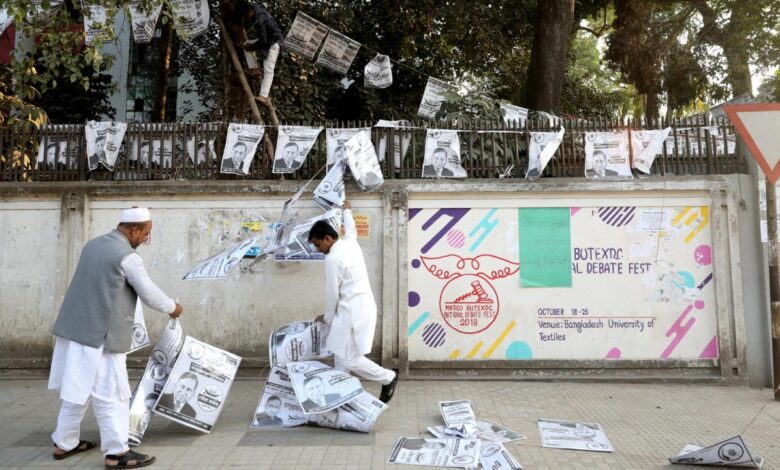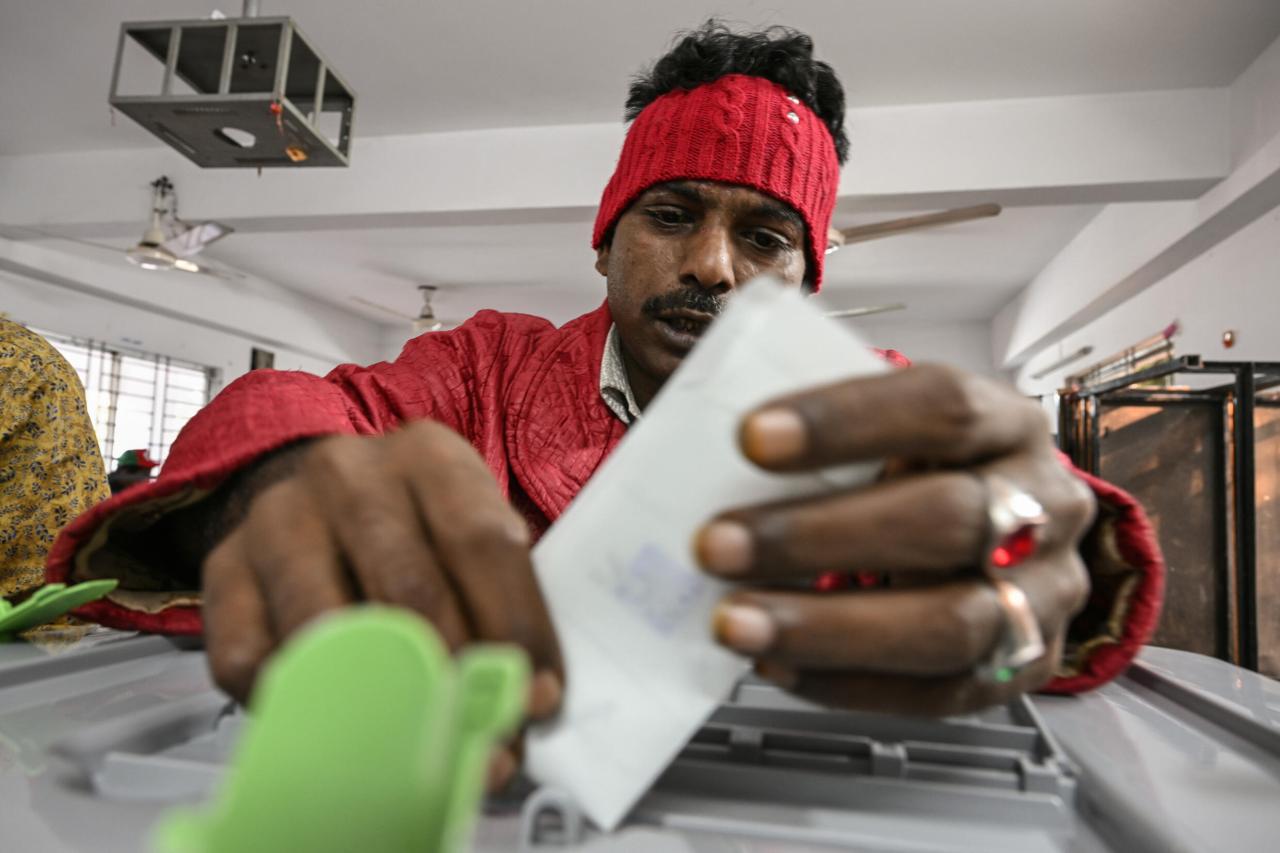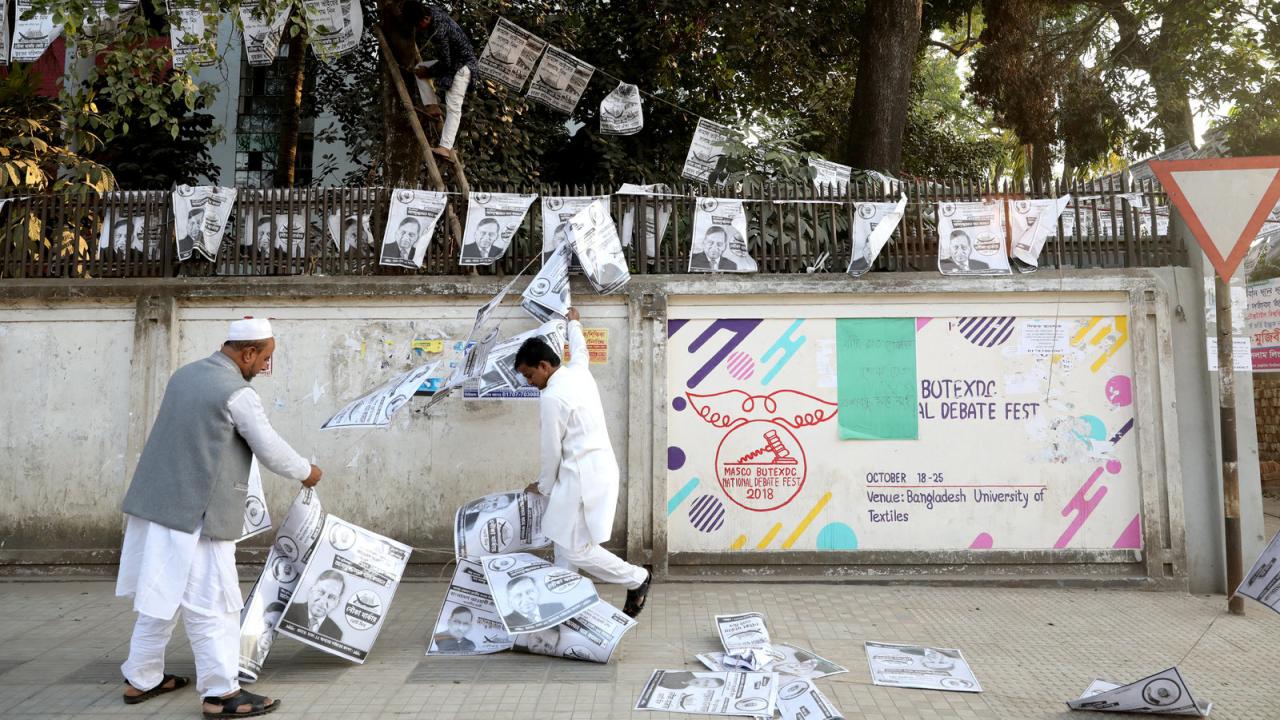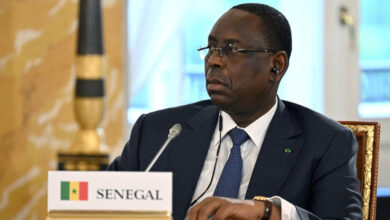
Bangladesh Votes in Election Without Opposition
Bangladesh votes in election without opposition – Bangladesh recently held elections with a notable absence of a strong opposition. This lack of competition has raised questions about the fairness and legitimacy of the process. While the ruling party secured a victory, concerns linger about the impact on democratic values and the future of political discourse in the country.
The election was marked by low voter turnout, with many citizens feeling disillusioned by the limited choices presented. The absence of a robust opposition has led to accusations of a rigged system and fears that the ruling party will continue to hold a dominant position in the political landscape.
The Context of the Election: Bangladesh Votes In Election Without Opposition

The recent election in Bangladesh has been a subject of much debate and scrutiny, particularly due to the absence of a strong opposition. To understand the nuances of this event, it’s essential to delve into the historical context of elections in Bangladesh and analyze the political landscape leading up to the election.
Historical Background of Elections in Bangladesh
Bangladesh has a history of holding elections since its independence in 1971. The country’s first general election was held in 1973, and since then, it has experienced various political transitions, including periods of military rule and democratic governance. Elections have often been marked by allegations of irregularities, voter intimidation, and manipulation.
However, the recent election stands out due to the unprecedented absence of a strong opposition.
Political Landscape Leading Up to the Election
The political landscape leading up to the election was characterized by a consolidation of power by the ruling Awami League party. The opposition, led by the Bangladesh Nationalist Party (BNP), faced significant challenges, including internal divisions and a crackdown by the government.
The BNP’s key leaders were either imprisoned or barred from contesting the election, effectively limiting their ability to mount a credible challenge.
Ruling Party’s Policies and Strategies
The Awami League, under the leadership of Prime Minister Sheikh Hasina, has implemented various policies aimed at economic development and social welfare. These include initiatives to improve infrastructure, promote education and healthcare, and reduce poverty. The party’s strategy for the election focused on highlighting these achievements and emphasizing the stability and progress under its leadership.
It’s hard to imagine the scale of the political apathy in Bangladesh, where voters recently participated in an election without any real opposition. The sheer lack of choice is a stark contrast to the situation in Gaza, where the current war has displaced an estimated 85% of the residents as fighting drags on.
While the Bangladeshi election might be seen as a sign of stability, the lack of real competition raises concerns about the long-term health of their democracy.
The government also implemented measures to control the media and restrict the activities of opposition parties, creating a climate of fear and intimidation.
It’s a stark contrast to see Bangladesh hold an election with no real opposition, while across the world, Taiwan’s political parties are gearing up for a pivotal election with a huge rally planned for the eve. The lack of meaningful competition in Bangladesh raises concerns about the legitimacy of the vote, while Taiwan’s vibrant political landscape is a testament to the power of democratic choice.
The Absence of Opposition
The lack of a robust opposition in Bangladesh’s recent election raises critical questions about the state of democracy and the fairness of the electoral process. While the ruling party secured a landslide victory, concerns remain about the limited participation and representation of diverse political viewpoints.
Reasons for the Absence of a Significant Opposition
The absence of a significant opposition in Bangladesh’s recent election is a complex issue with several contributing factors.
- Political Polarization:The political landscape has become increasingly polarized, making it challenging for opposition parties to gain traction and mobilize support. This polarization can stem from ideological differences, historical grievances, and the influence of powerful political figures.
- Incumbent Advantages:The ruling party often enjoys significant advantages, including access to state resources, media control, and a well-established political machinery. These advantages can make it difficult for opposition parties to compete effectively.
- Allegations of Electoral Irregularities:Concerns have been raised about electoral irregularities, including voter intimidation, ballot stuffing, and manipulation of the electoral process. These allegations, if substantiated, can undermine the credibility of the election and discourage opposition participation.
- Suppression of Dissent:Opposition leaders and activists have faced intimidation, harassment, and even arrests, creating a climate of fear and self-censorship. This suppression of dissent can discourage potential opposition candidates from participating in the electoral process.
Challenges Faced by Opposition Parties
Opposition parties in Bangladesh face significant challenges in building a strong and viable force.
- Limited Resources:Opposition parties often lack the financial resources and organizational infrastructure to effectively compete with the ruling party. This can limit their ability to reach voters, conduct campaigns, and build a strong political base.
- Media Bias:The media landscape in Bangladesh is often seen as being biased towards the ruling party. Opposition parties struggle to gain fair and balanced coverage, limiting their ability to communicate their message to the public.
- Lack of Public Trust:Opposition parties may face a lack of public trust due to past failures, allegations of corruption, or perceptions of being ineffective. This can make it difficult for them to mobilize support and build a strong base of voters.
- Internal Divisions:Opposition parties often suffer from internal divisions and factionalism, which can weaken their overall strength and effectiveness. These divisions can make it difficult for them to present a united front and effectively challenge the ruling party.
Potential Impact of the Absence of a Strong Opposition
The absence of a strong opposition can have several negative consequences for the electoral process and the overall health of democracy.
- Reduced Accountability:Without a strong opposition to hold the government accountable, there is a greater risk of corruption, abuse of power, and a lack of transparency. The ruling party may be less responsive to the needs and concerns of the people.
- Limited Choice for Voters:The absence of a viable opposition limits the choice for voters, reducing their ability to express their preferences and hold the government accountable. This can lead to voter apathy and a decline in political participation.
- Erosion of Democratic Norms:The lack of a strong opposition can contribute to the erosion of democratic norms and institutions. This can create a climate of fear, suppression of dissent, and a weakening of the rule of law.
- Increased Political Instability:A lack of a strong opposition can contribute to political instability, as there is no effective mechanism for challenging the ruling party and providing an alternative vision for the future. This can lead to social unrest, protests, and even violence.
Voter Participation and Turnout
The voter turnout in the election was significantly lower than in previous elections. This low turnout is a cause for concern, as it raises questions about the legitimacy of the election results and the overall health of the democratic process in Bangladesh.
Factors Influencing Voter Participation
Several factors contributed to the low voter turnout in the election.
- Lack of a Competitive Opposition:The absence of a strong and credible opposition party discouraged many voters from participating. With no viable alternative to the ruling party, many voters felt that their vote would not make a difference.
- Allegations of Voter Fraud and Intimidation:Reports of widespread voter fraud and intimidation by the ruling party further alienated voters and discouraged them from participating. The lack of transparency and accountability in the electoral process eroded public trust and confidence in the fairness of the election.
- Political Apathy and Disillusionment:A growing sense of political apathy and disillusionment among the electorate also contributed to the low turnout. Many voters felt that the political system was rigged against them and that their voices were not being heard.
Potential Implications of Voter Turnout on the Election Results, Bangladesh votes in election without opposition
The low voter turnout had several potential implications for the election results.
- Reduced Legitimacy of the Election:A low turnout raises questions about the legitimacy of the election results, as it suggests that a significant portion of the electorate did not participate in the democratic process. This can undermine the credibility of the government and its mandate to rule.
- Limited Representation of the Electorate:When a large segment of the population does not participate in the election, the elected government may not accurately represent the views and interests of the entire electorate. This can lead to a disconnect between the government and the people it is supposed to serve.
- Weakening of Democratic Institutions:A low voter turnout can also weaken democratic institutions by reducing public engagement in the political process. This can lead to a decline in civic participation and a weakening of the checks and balances that are essential for a healthy democracy.
It’s hard to ignore the news coming from Bangladesh, where the recent election saw a near-total lack of opposition. It’s a stark contrast to the international stage, where Israel is preparing to defend itself against a case alleging genocide in Gaza at the UN’s top court, as reported in this article.
These events highlight the very different ways in which democracy and justice are being pursued around the world.
The Election Process and Results
The election process in Bangladesh, despite the absence of a robust opposition, proceeded through a series of well-defined stages. The process, though technically complete, raised concerns about fairness and transparency due to the lack of meaningful competition.
Key Stages of the Election Process
The election process in Bangladesh generally follows a standardized framework, encompassing several key stages.
- Candidate Nomination:Candidates from various political parties, including the ruling Awami League, submitted their nominations. The absence of a strong opposition meant that the nomination process lacked the usual competitive dynamics.
- Campaigning:The campaign period saw the ruling party actively engaging in promotional activities. However, with limited opposition participation, the campaign lacked the usual debates and critical scrutiny.
- Voting Day:On the designated voting day, citizens participated in the election. While voter turnout was reported to be high, the absence of a credible opposition raised concerns about the genuine participation and choice for voters.
- Counting and Results:The election commission conducted the vote counting process, ultimately announcing the results. The ruling Awami League secured a landslide victory, winning a majority of the seats in parliament.
Election Results and Margin of Victory
The election results reflected the dominance of the ruling Awami League, which secured a substantial majority of the seats in the parliament. The party’s victory margin was significant, indicating a lack of strong competition.
Potential Challenges and Irregularities
The absence of a meaningful opposition raised concerns about the fairness and transparency of the election process. While the election commission reported a high voter turnout, the lack of competitive dynamics led to concerns about the genuineness of voter participation.
“The election process, while technically complete, lacked the crucial element of a robust opposition, raising concerns about its fairness and transparency.”
The Implications of the Election

The absence of a meaningful opposition in the recent Bangladesh election has profound implications for the country’s political landscape, the ruling party’s future, and the nation’s development trajectory. While the election itself might have been deemed “successful” in terms of voter turnout and a seemingly smooth process, the lack of a robust opposition raises concerns about the long-term health of Bangladesh’s democracy.
The Impact on Bangladesh’s Political Landscape
The absence of a strong opposition creates a political environment where the ruling party enjoys an overwhelming majority. This can lead to a lack of checks and balances, potentially allowing for unchecked power and a weakening of democratic institutions. The absence of robust debate and alternative viewpoints can stifle innovation and limit the scope for policy improvements.
Additionally, it can lead to a sense of apathy among voters, who may feel their voices are not being heard.
The Implications for the Ruling Party and its Future
While the ruling party may initially benefit from a lack of opposition, this situation can also present challenges. The absence of a strong opposition can create a sense of complacency and reduce the ruling party’s motivation to address critical issues.
This can lead to a decline in public trust and support, potentially impacting the party’s long-term political viability. The lack of a robust opposition can also lead to a lack of accountability and transparency, as the ruling party may feel less pressure to address concerns or provide explanations for its actions.
The Potential Challenges and Opportunities for the Country’s Development
The absence of a robust opposition can create challenges for the country’s development. Without a strong opposition to hold the government accountable, there is a risk that development initiatives may not be implemented effectively or may favor certain interests over others.
This can lead to inequalities and a widening gap between the rich and poor. However, the lack of opposition can also create opportunities for the government to implement long-term policies and programs without facing significant political hurdles. This can lead to greater stability and a more predictable environment for investors and businesses.
Closing Notes
The election in Bangladesh has highlighted the fragility of democratic institutions and the importance of a vibrant and competitive political environment. The absence of a strong opposition has created a power vacuum that could have long-term consequences for the country’s political and economic future.
It remains to be seen whether the ruling party will use its newfound power to address the concerns of its citizens or further consolidate its control.






